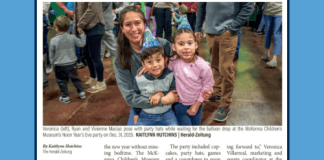In the latest episode of Looking Back, Moving Forward, the legendary organizer and movement leader reflected on her “lifelong struggle” for intersectional economic justice—and what feminists need to do next. “We’ve got to keep on marching. We’ve got to keep on protesting. It is going to make a difference.”
Dolores Huerta has spent 70 years at the frontlines of the intertwined fights for economic justice and women’s rights.
In 1955, Huerta founded the Stockton, Calif., chapter of the Community Service Organization, which organized for economic justice within the Latinx community. In 1962, Huerta and Cesar Chávez founded the National Farm Workers Association, now known as the United Farm Workers’ Union, and she continued to serve as vice president of the organization for over 35 years, winning groundbreaking victories for farmworkers.
In 1987, Huerta became a founding board member of the Feminist Majority Foundation, which now publishes Ms. In 2003, Huerta founded the Dolores Huerta Foundation, which cultivates grassroots movements nationally, and she still serves as its president.

Huerta has pioneered campaigns to expand political representation for women and people of color; advance policies that improve the lives of women, LGBTQ+ folks, farmworkers, communities of color, and the poor; and spark dialogue around the intersectional fight for economic justice, and the ways it is intertwined with our democracy.
For the third episode of the Ms. Studios podcast Looking Back, Moving Forward, she talked to me about what she’s learned in a lifetime of activism, why she still believes that “we are going to be victorious,” and what she believes feminists need to do now to meet this moment—and win.
Huerta is joined in this episode by Springboard to Opportunities founding CEO Aisha Nyandoro, National Women’s Law Center vice president for education and workplace justice Gaylynn Burroughs, labor and women’s rights historian Premilla Nadasen, and economists Rakeen Mabud and Lenore Palladino. Together, we traced 50-plus years of feminist resistance to workplace discrimination, women’s disproportionate unpaid domestic and care burdens, and the sociopolitical factors that push women, in larger numbers, into poverty—revealing both how the system seeks to devalue all of “women’s work,” and what we can do about it.
This interview has been edited and re-organized for clarity and length.
Carmen Rios: What was your journey to the work that you do? What are the experiences that lead you to this lifelong fight for economic justice, and how does that fight become intertwined with feminism for you?
Dolores Huerta: When you see the injustices that there are in low-income communities and people-of-color communities and for women in general, then you realize that this is not right, and that we should do something to change it. This is what has perpetuated me into this lifelong struggle—because even though, with 70 years of my life devoted to making things better, and having a lot of successes, we’re not done yet. There’s still a lot more work to do.
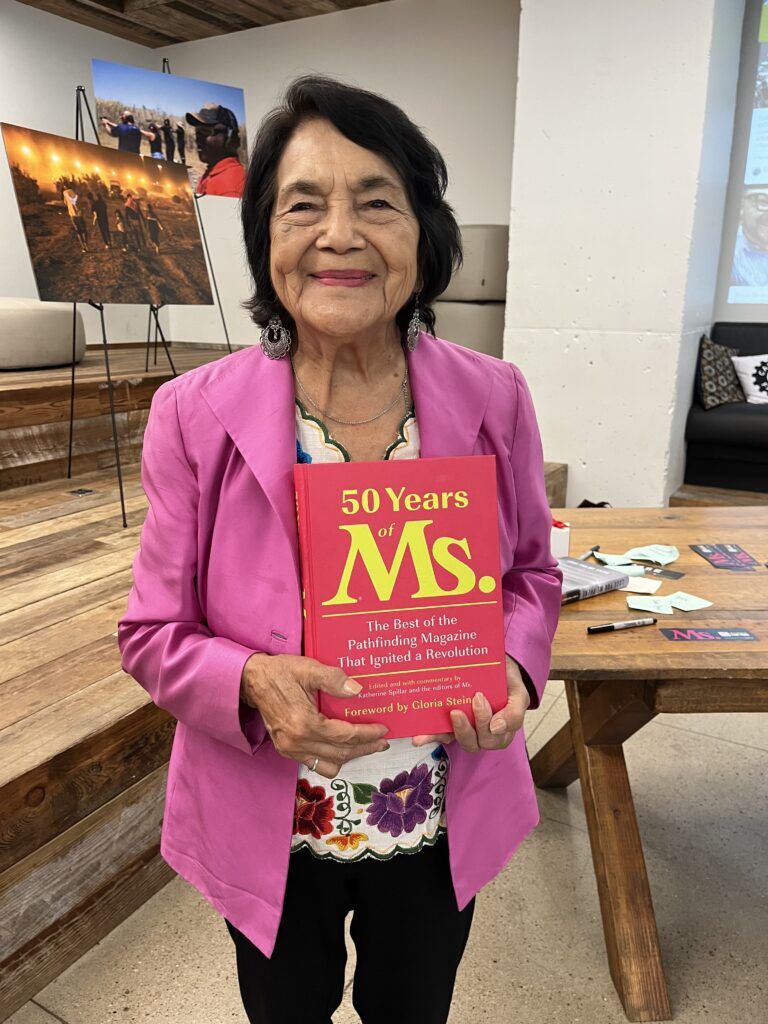
Rios: How has feminism shaped the way you approach these issues of economic justice, and how does your background in the labor rights movement shape your feminism? Has Ms. been part of your journey as a labor organizer, as a feminist?
Huerta: Being a woman, you’re affected by some of the injustices. On the other hand, when you see that many of the changes that have been made have been made with women speaking out—whether we’re talking about slavery, with Harriet Tubman, about women’s right to vote and the women’s movement, being able to make that happen, when we see great leaders like Hillary Clinton, Elizabeth Warren, Alexandria Ocasio-Cortez, there’s the inspiration that we, as women, need to keep on fighting.
Ms. really gave me the inspiration to continue working, because, as a woman and being an organizer, you have so many pushbacks and so many obstacles that are put in front of your work by men who don’t appreciate what you’re trying to do, or they think there’s something wrong with what you’re trying to do. So, Ms. is the armor that we had to be able to say: No, you’re doing the right thing. Keep going forward, with this magazine in your hand. This is all of the armor that you need. This is what will protect you. The feminists are behind you.
In my own path, because I work mostly with men—at the leadership level and not at the ground level; at the ground level, there were a lot of women, and they were all so supportive—but the men were always getting in the way, trying to undermine my work. Just knowing that Ms. magazine existed, that feminist organizations existed, became the spiritual support that I needed to keep going forward. To know that I was not alone, that there were women out there fighting not only for women’s rights, but fighting for equality for everyone. It’s such an important support system that women need, especially when they feel so isolated and alone in what they’re trying to do.
This is a very, very scary time—and god knows it’s a time for women to rise up!
Dolores Huerta
Rios: What are the major changes that you think have led us to where we are now, both good and bad? What are some of those pivotal moments that you can think of in this journey that we’ve all been on together?
Huerta: Words are very important. The terms “gender equity” and “gender equality”—that was very important, because then, all of a sudden, we looked around the room and said, hey, wait a minute, there’s not enough of us feminists in the room. Then Feminist Majority, they spearheaded the campaign to get more women elected, and not only to Congress, but to state legislatures, school boards, et cetera, and that made a tremendous difference. We have seen that so much of the legislation that has passed at the local level and at the national level is led by feminists, by women who are carrying the torch.
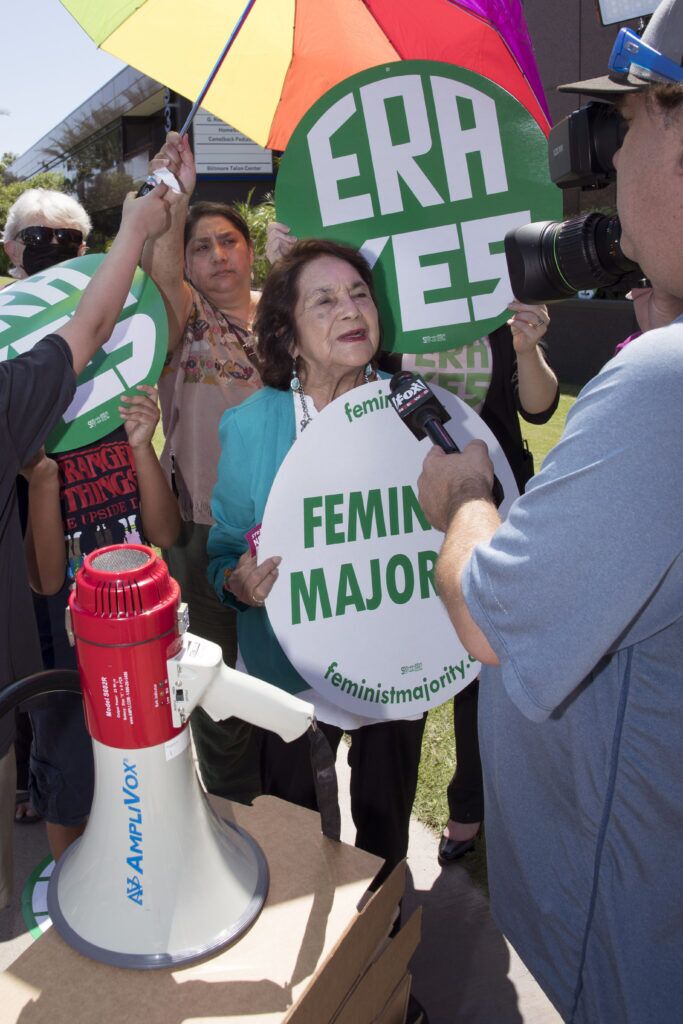
Rios: Your work has centered people and women who are often obscured even inside these movements and these conversations about gender justice and economic justice—immigrants, people of color, the poor, the working class. How do we build a movement for economic justice that really lifts everyone up, that leaves no one behind? How do you think feminists can do that moving forward?
Huerta: We definitely have to reach out. I know that the feminist movement has already done that. We have to do a lot more than what we’re doing now. We have to reach women where they’re at, not where we’re at.
Unfortunately, when we use the word “feminism,” that is a very distinct qualification, a very distinct description, because we know that not all women are feminists. We have to continue to educate those women that are not feminists, to make them understand what the difference is. What is it that feminists fight for? Feminists fight for equality—not just for women, but for all people. There’s a very big distinction.
We just have to do a lot more organizing. We have to find more resources so that we can reach the people that need to be reached—and that includes women and men, because they also need to be educated on women’s equality, women’s rights, women’s right to abortion. So many people are anti-feminist, anti-abortion and anti-gay because of their teachings from the church, and the religious right, because they are so huge and they have organizations in every single community through their priests or their ministers. They are the ones that are out there preaching against women’s rights and against LGBTQ rights.
It’s incumbent upon the women’s movement that we have to do so much more organizing, so much more educating. We know that takes a lot of resources, and when we have to use our resources just to keep getting our message out, often we don’t have enough money for the resources that we need to do the campaigning and the organizing—and I’m talking about the deep down type of educating that needs to be done.
I can look back into my own history, and I can see how things have changed over the decades. … We know how to reach that goal line of equality.
Dolores Huerta
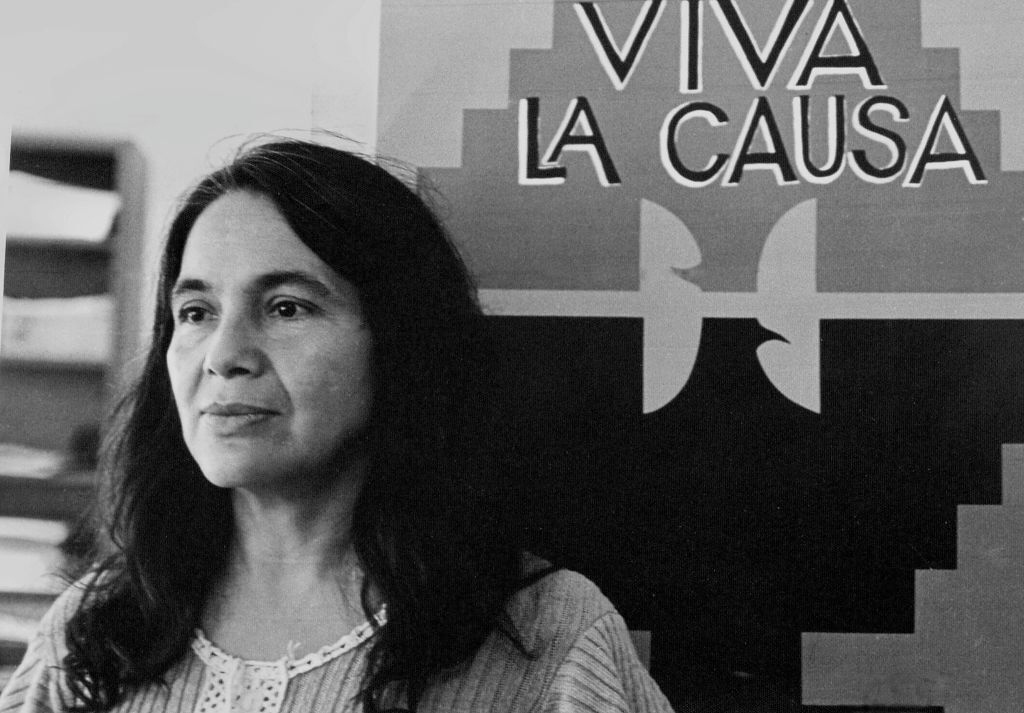
Rios: What are you focused on now, in the short term? Are there things you think people should be working towards right now in this moment with the challenges that we face?
Huerta: When we see the way that our undocumented immigrants and people of color are being treated right now, the very brutal, fascist way that people are being taken—they’re being kidnapped, they’re being taken into prisons, they’re talking about sending them to other countries. The cruelty, the bizarre way that people are being treated, that their human rights and their civil rights are being violated—this is very, very scary. If there’s ever a time that we have to come together and we have to rise up and we have to march and protest, then now is the time, because I think most of us never thought that we would see this moment come to the United States of America.
People of color have always experienced these kinds of actions, but never at the level that we’re seeing now. And it’s not just people of color. It’s children. It’s women. All of us are being affected.
Now, they’re talking about taking away food. The food bank in our area here has been closed. In a country that is so rich and powerful, where we provide food for the rest of the world, that our own people in our own country are going to be deprived of food and medical care, educational resources that they had before—this is a very, very scary time, and god knows it’s a time for women to rise up!
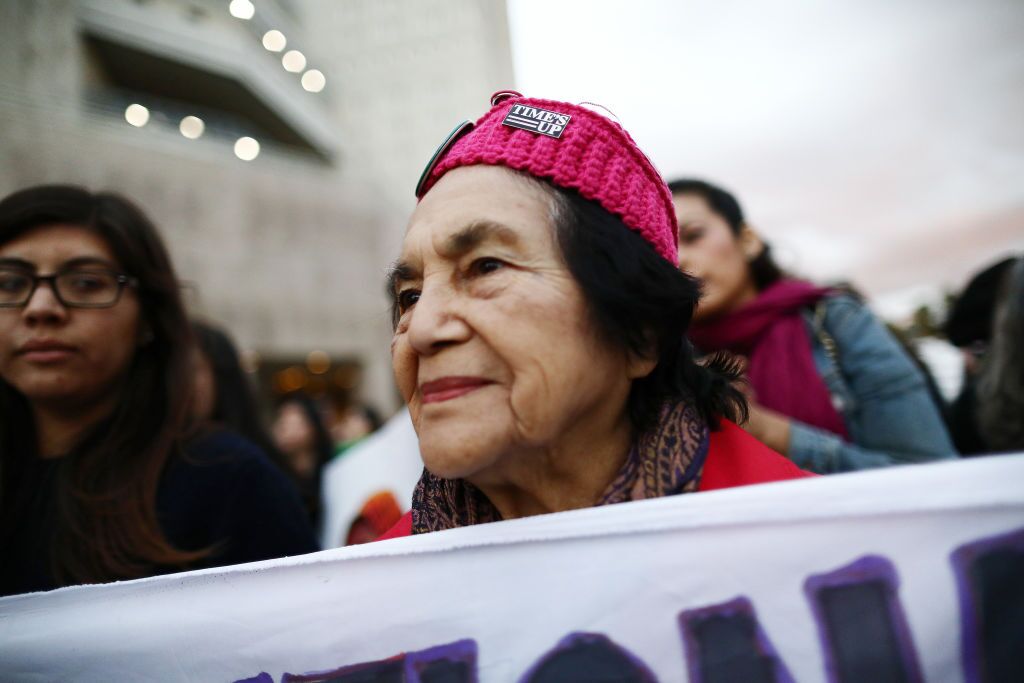
We’re focusing right now on immigrants’ rights and providing our immigrant community with the resources that they need. We have many families who have had members deported, so we’re trying to provide food for some of those families, gathering money for rental assistance, and also providing them with the information that they need in case some family member gets deported. We’re trying to be as supportive as we can right now for the immigrant community. We’re also fighting the other battles that we have on the education front, because you have these MAGA people that are coming into the rural parts of California, especially, and trying to ban books and trying to roll the clock back in terms of ethnic studies. We’re doing a big boycott of Target because they’ve taken away their diversity, inclusion, and equity policies. And, of course, we were marching, fasting, protesting against this congressional bill that takes away Medi-Cal, Medicare, cutting again the food stamp program, cutting away the resources they need for education for our disabled children.
So much is happening right now. We’re right here on the front lines of the battle. This is almost a daily struggle that we’re in right now.
Rios: In this troubling moment, a lot of people are struggling right now to remain hopeful, to feel like there’s anything tangible that we can do to take control and expand or even protect these rights that we have. What keeps you motivated in a moment like this?
Huerta: I’m 95 years old this year, and I can look back into my own history, and I can see how things have changed over the decades. Knowing that there can be change, that we can change people’s minds, that we can accomplish some of the objectives that we are trying to reach—then we know that it can happen. Who would have thought, way back when I started organizing, that we would have the majority of women in many state legislatures, or equal numbers of women in many state houses? In some places, now women are the majority in many of our state legislatures, and in our Congress, we’re much closer to that. We have seen that the goals have been accomplished.
When you’re getting close to the goal line and you’re getting ready to make that touchdown, that makes it a lot more difficult. That’s where we’re at right now—we’re getting a lot of pushback from people in power. But the great thing is that we can take from our own accomplishments, from our own lessons of achievement, because we know how to reach that goal line of equality.
We are being tested in terms of our organizational capacities and whether we can all come together to defend ourselves against fascism and to save democracy, and I think that we’re going to be able to overcome.
Dolores Huerta
Rios: What lessons do you think we should take from our collective history here in this movement and what have you learned in your time doing this work that you think activists today working on these issues need to know?
Huerta: We can look at our successes and see what we have accomplished, which have been pretty incredible when you think of the short time. In my own personal journey, I was very confused about some of the issues, but marching with feminists certainly helped me clear up some of my own beliefs and some of my own attitudes. This is what’s important, because if I went through this transition of being anti-abortion to pro-choice—I reached that conclusion with Gloria Steinem, to say no, it’s not just about choice, it’s about women’s rights to decide what they want to do with their body and their right to abortion.
This is a long journey, and if we can make that journey and that path to justice a lot shorter, then that is what we have to do. We have to go out and become preachers and have more boots on the ground.
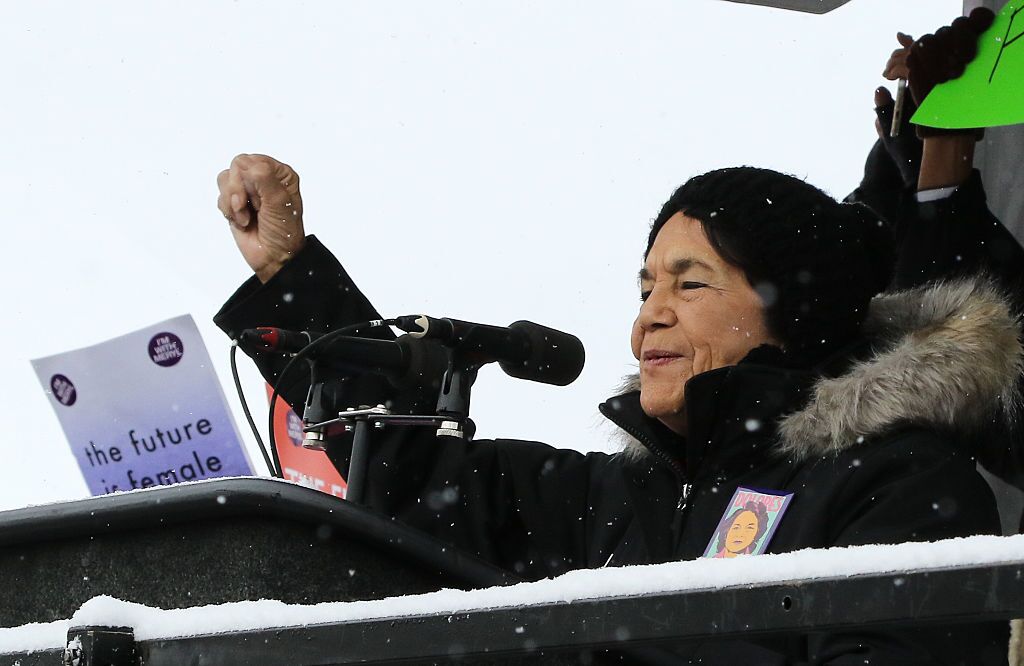
Rios: What do you hope, in 50 years, a conversation like this is recalling? How can we start making it all possible now?
Huerta: We would hope that, 50 years from now, feminism has really reached its goal. That we will have peace in the world, because feminists have taken power, and the democracy is actually working. That we have a woman president or have many women presidents in the United States of America, like they now have in Mexico.
We have seen the light. We have seen what it can actually accomplish, and when we have this throughout the world, not just the United States of America, then we will know that we can bring peace to the world. Instead of competition, we can have cooperation. We share the resources. We have the feminist values of supporting everybody—not just women, but supporting our children, our youth, and even men, helping them to also become feminists and to join in our struggle of equality and compassion and cooperation.
We’ve got to keep on marching. We’ve got to keep on protesting. The marches that were held on No Kings Day really showed to the world that the people have the power, and when the people go out there and protest and they march and they’re very visible in what they’re doing, this does send a message to the people that are trying to oppress us, and I think it is going to make a difference.
We just saw this great victory in New York City, where we had a Muslim democratic socialist that was elected in the Democratic primary up there. Hopefully, he’ll make it to the mayor. When we see this happening, and you see young people and you see young women out there, both men and women feminists out there doing the work, that is the inspiration that we need. We’re right in the middle of this enormous battle, but we know that all of us coming together, all of us fighting on a very united front and then confronting those people that are creating so much of this damage will make a difference. We have to identify the oppressors, and we have to make strategies and plan how we are going to confront them—and, hopefully, at the end of the day, educate them about why they have to support a woman’s right to abortion, why they have to support the LGBTQ community, why they have to support immigrants’ rights.
With all of us coming together, at the end of the day, we’re going to be victorious. Right now, we are being tested in terms of our democracy. We are being tested in terms of our organizational capacities and whether we can all come together to defend ourselves against fascism and to save democracy. This is the time. We are being tested, and I think that we’re going to be able to overcome.
Sí, se puede.
Great Job Carmen Rios & the Team @ Ms. Magazine Source link for sharing this story.



